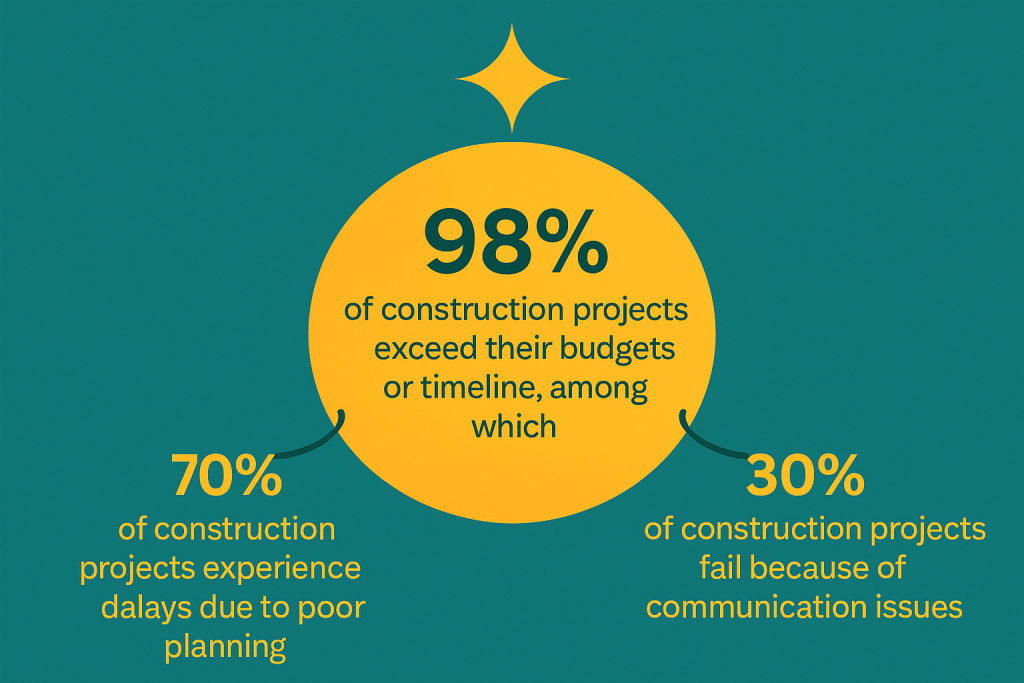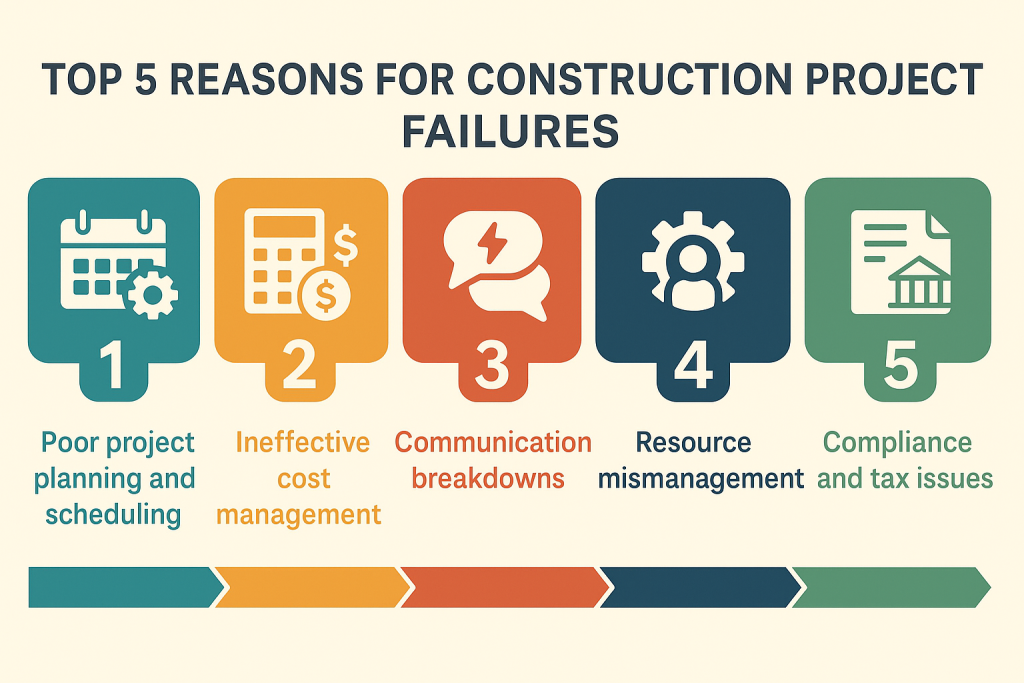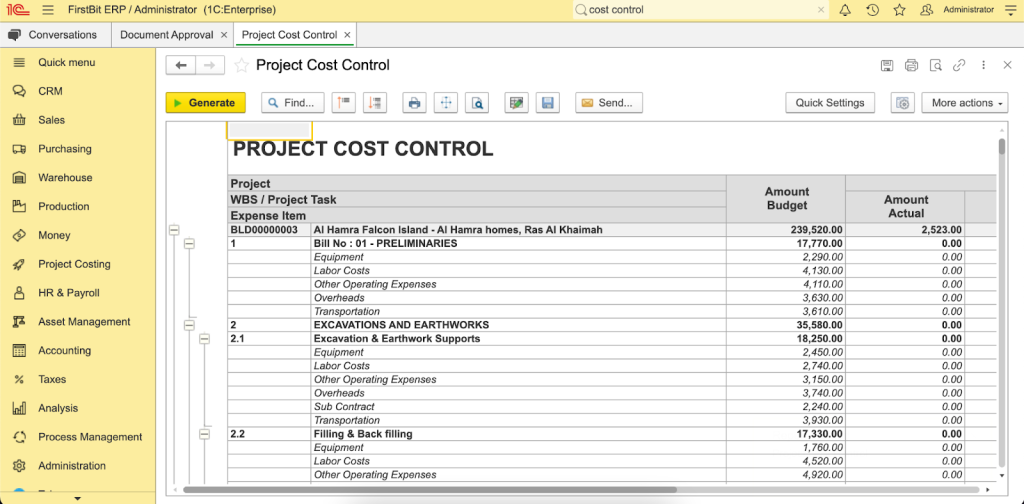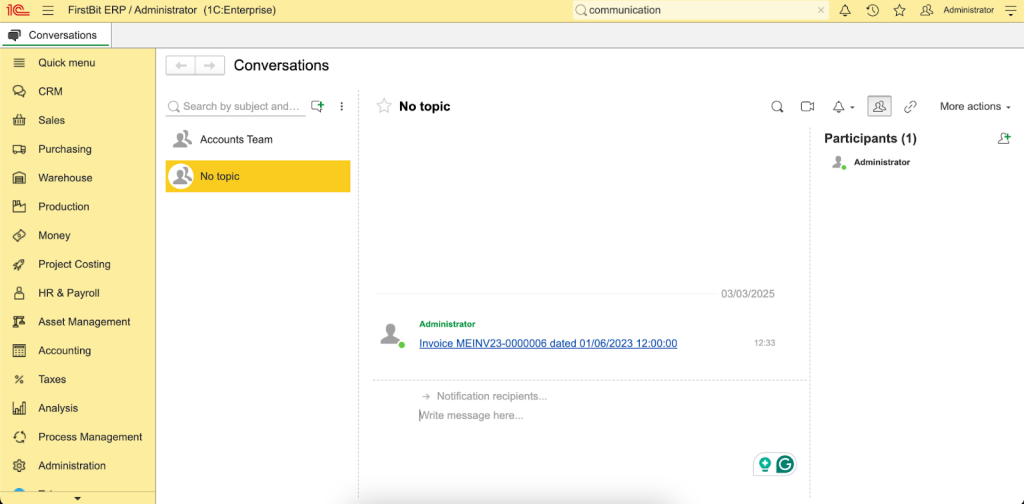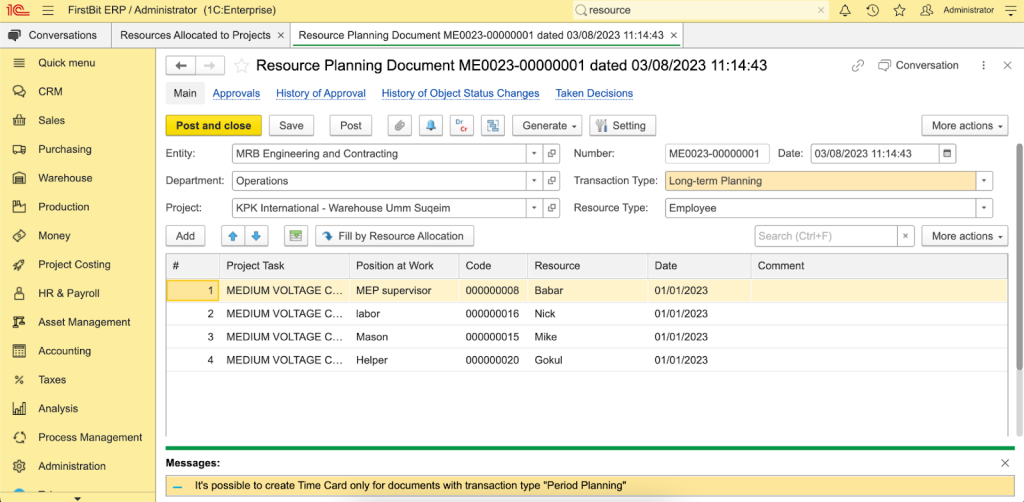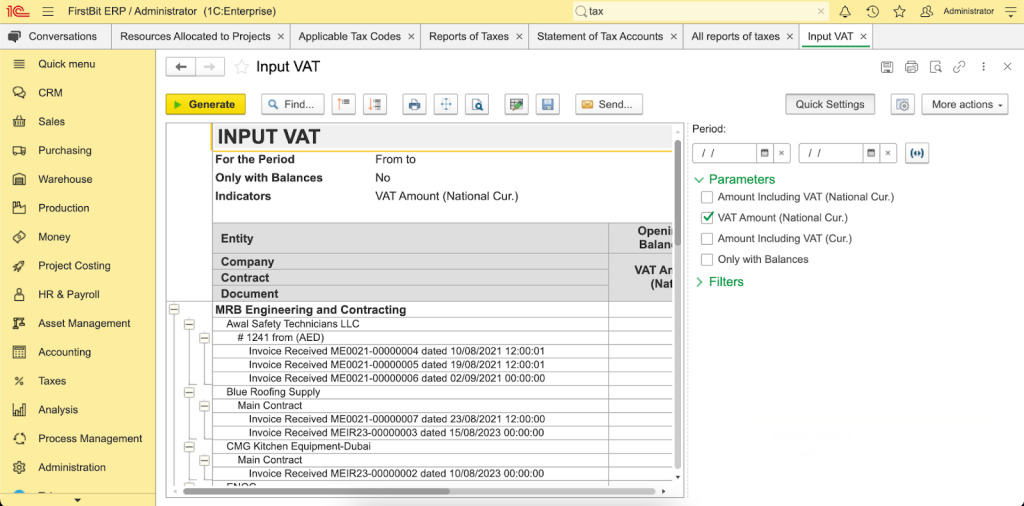Did you know that 98% of construction projects exceed their budgets or timelines?[?]
If you're reading this, it's likely because you've experienced the frustrating setbacks that can make or break a construction project. Maybe you've faced unexpected delays that threw off your entire schedule or budget overruns that ate into your profits. Or perhaps keeping your team, contractors, and suppliers aligned has been a constant challenge, leading to miscommunication and inefficiencies.
The reality is, even the most well-funded projects can hit major roadblocks without proper planning and execution. Issues like inaccurate cost estimates, scheduling conflicts, and poor risk management don’t just cause delays — they can lead to disputes, financial losses, or worse, project abandonment.
In this guide, we’re going to uncover the five biggest reasons construction projects fail — and more importantly, how you can avoid these common pitfalls. Whether you're an experienced business owner or just getting started, these tips will help you streamline your projects, reduce costs, and get things done without the usual headaches. Let’s dive in!
1. Poor Project Planning and Scheduling
Without a solid plan, a construction project is set up for failure right from the start. Poor planning and scheduling can lead to delays, budget overruns, and resource mismanagement.
When project plans are rushed or incomplete, things start to fall apart. This is especially true when timelines are unrealistic or fail to consider the inevitable hiccups, like bad weather or material shortages.
In fact, studies show that 70% of construction projects experience delays due to poor planning.[?]
These delays don’t just add time—they cause a domino effect that impacts everything from labor costs to project timelines.
For example, a case study by Hendershot Cowart P.C. discusses a situation where a subcontractor faced a lawsuit due to alleged delays in delivering materials, which the general contractor claimed caused the project to fall behind schedule and resulted in over $650,000 in damages.[?]
Additionally, research indicates that construction delays often lead to increased labor costs due to factors such as idle labor during work stoppages, extended work hours requiring overtime pay, and the need for additional supervision to coordinate recovery efforts.
Without a detailed, realistic project schedule, it becomes nearly impossible to bounce back from unexpected delays. Building flexibility into your schedule isn’t just smart; it’s essential. Even small setbacks, like a two-day weather delay, can quickly snowball if there’s no room in the schedule to adjust.
Streamlining Project Planning and Scheduling
In construction, planning isn’t just about setting deadlines but staying ahead of challenges before they derail progress. Without a structured system, delays and resource mismanagement can creep in, leading to costly overruns.
A solid project management framework keeps schedules realistic, resources optimized, and teams aligned, ensuring that projects run efficiently from start to finish.
Integrate FirstBit’s project management module in the ERP
-
Create structured project timelines with built-in buffer periods to absorb unexpected delays.
-
Assign and track resources in real time to prevent bottlenecks.
-
Monitor progress dynamically and adjust schedules instantly when needed.
-
Improve coordination across teams to eliminate miscommunication and inefficiencies.
Pro Tip. Keep buffer time in your schedule. Industry studies show that adding a 10-20% buffer to your timelines can help account for unforeseen delays, making your project less prone to disruptions.
Boost project performance
Assign the right people to the right tasks
Request a demo
2. Ineffective Cost Management
Cost overruns are a common issue, often stemming from inaccurate estimates, price fluctuations, or unexpected project changes. Without proper tracking, costs can quickly escalate, and small discrepancies may snowball into major financial setbacks.
When expenses exceed the planned budget, the financial impact becomes harder to control. This not only causes financial strain but also leads to the contractor losing the trust of their client, who then decides to take their future business elsewhere.
Proactive cost management ensures that deviations are identified early and adjustments are made before the project runs into financial trouble. Ongoing monitoring and oversight are crucial to keeping expenses under control and preventing last-minute surprises.
Mastering Cost Control
Unexpected expenses can turn a profitable project into a financial headache. Cost control starts even before construction begins — with accurate estimates based on real data, not guesswork. Inaccurate budgets open the door to overruns, and without real-time tracking, small deviations can snowball into major financial setbacks. Smart cost management means getting the numbers right from the start and catching any drift early to keep the project financially on track.
Use FirstBit’s cost control feature
-
Automate real-time tracking of expenses to prevent budget overruns.
-
Get instant alerts when costs exceed planned thresholds so you can take action.
-
Compare actual expenditures against budget forecasts to detect inefficiencies.
-
Adjust financial strategies proactively to maintain a healthy cash flow.
Ensure timely and profitable project completion with FirstBit
Request a demo
3. Communication Breakdowns
Construction projects require seamless communication to avoid misunderstandings, mistakes, and delays. When communication isn’t handled effectively, everyone involved suffers — especially the client. If subcontractors aren’t on the same page with the project manager or the client isn’t updated about a delay until it's too late, the entire project can come to a screeching halt.
Did you know that communication issues account for 30% of project failures?[?]
That’s a huge number, and it’s usually the small details — like missed design changes or delayed approvals — that cause the most damage.
It’s not just about keeping everyone in the loop. It’s about being clear, transparent, and organized. With the right communication system, you can avoid the common mistakes that turn into costly delays.
Staying in Sync with Your Team
Construction projects involve multiple stakeholders, and poor communication is often the root cause of costly mistakes. When updates are scattered across emails, calls, and notes, critical information gets lost. A centralized communication system ensures everyone is on the same page, reducing errors and decision-making delays.
Use FirstBit’s project communication tools
-
Centralize all project updates and documentation in one accessible platform.
-
Enable real-time collaboration to keep teams informed and aligned.
-
Automate notifications for critical project changes to avoid miscommunication.
-
Ensure approvals and revisions are handled efficiently to reduce errors.
Keep your project on track
Manage every phase efficiently with ERP tools
Request a demo
4. Resource Mismanagement
Resource mismanagement is a key contributor to delays and unexpected costs in construction. Whether it’s labor, materials, or equipment, poor allocation can lead to idle time, wasted materials, and underutilized resources.
When multiple projects are involved, managing resources effectively becomes even more challenging. Misjudging timelines, failing to track equipment, or ordering materials at the wrong time creates inefficiencies that escalate costs and extend timelines. A strategic approach to resource management ensures maximum efficiency, minimizing downtime and delays.
Optimizing Resource Usage
Inefficient resource allocation can lead to wasted materials, idle equipment, and unnecessary expenses. Maximizing resource utilization means tracking assets in real time, identifying inefficiencies, and ensuring that every material, tool, and workforce hour is put to its best use.
Use FirstBit’s resource management feature
-
Track equipment and material usage in real time to minimize waste.
-
Identify underutilized resources and redistribute them to maximize efficiency.
-
Monitor equipment availability across multiple sites to reduce downtime.
-
Maintain visibility into inventory levels to prevent shortages and delays.
Prevent cost overruns
Request a demo
5. Compliance and Tax Issues
In the UAE, regulatory non-compliance is a leading cause of project delays and financial penalties. Construction firms must secure permits from authorities like Dubai Municipality or Abu Dhabi DMT before starting work. Skipping or delaying approvals can result in stop-work orders or forced redesigns.
Strict labor laws under the UAE Labour Law (Federal Decree-Law No. 33 of 2021) require safe working conditions, summer midday breaks, and proper accommodations. Violations can lead to fines or blacklisting.
Financial compliance is just as critical. Construction services are subject to 5% VAT, and errors in invoicing or reporting can trigger audits and penalties from the Federal Tax Authority. Firms must also meet Economic Substance Regulations (ESR) and Anti-Money Laundering (AML) rules, especially when operating in free zones.
Ignoring these requirements risks more than fines — it can derail entire projects.
Keeping Compliance Simple
Regulatory compliance is a moving target with shifting safety standards, permit requirements, and inspection deadlines. Managing these manually increases the risk of fines, delays, and legal complications. Automating compliance tracking simplifies the process and ensures projects remain on the right side of regulations.
Invest in compliance software to streamline your reporting and avoid last-minute scrambling. Automating this process can save you time, money, and stress.
Here’s how FirstBit’s compliance management features help:
-
Organize and track permits, safety reports, and regulatory documents effortlessly.
-
Get automated reminders for upcoming compliance deadlines to avoid last-minute rushes.
-
Generate audit-ready reports instantly, saving valuable administrative time.
-
Ensure adherence to industry regulations, reducing legal and financial risks.
Boost project performance
Assign the right people to the right tasks
Request a demo
Conclusion
Challenges are part of the construction business, but they don’t have to control the outcome. Issues like poor planning, cost overruns, miscommunication, and resource mismanagement can be avoided with the right strategies and tools in place.
When you have live project updates, tight cost controls, strong communication, and smart compliance tracking, you’re not just keeping things moving — you’re protecting your budget, timeline, and reputation.
The construction companies that succeed aren’t the ones that avoid every problem but are the ones prepared to handle them. With integrated solutions and a proactive approach, you can run projects more smoothly, deliver better results, and build a stronger, more profitable business.
FAQ About Construction Project Failures
1. What early warning signs suggest a construction project might be heading toward failure?
2. If a project is falling behind schedule, what’s the first thing project managers should do?
3. How can financial damage from cost overruns be minimized during a project?
4. What are some overlooked communication gaps that often cause problems on construction sites?
5. How should project managers handle subcontractor delays without derailing the full project?
Ensure timely and profitable project completion with FirstBit
Request a demo

Umme Aimon Shabbir
Editor at First Bit

See FirstBit ERP solutions in action
Discover how our system solves the unique challenges of contractors in a personalized demo.
After the demo you will get a quotation for your company.
After the demo you will get a quotation for your company.





